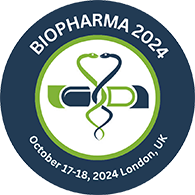Call for Abstract
Scientific Program
4th International Conference and Expo on Biopharmaceutics and Biologic Drugs, will be organized around the theme “Theme: - Advances in drug formulation, delivery systems, and pharmacokinetics.”
Biopharma 2024 is comprised of keynote and speakers sessions on latest cutting edge research designed to offer comprehensive global discussions that address current issues in Biopharma 2024
Submit your abstract to any of the mentioned tracks.
Register now for the conference by choosing an appropriate package suitable to you.

